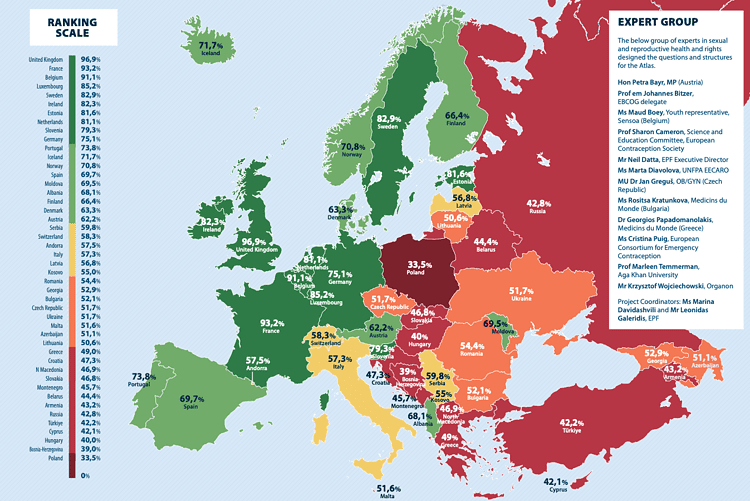Access to contraceptives in Europe remains ‘very uneven’, according to a new report from the European Parliamentary Forum for Sexual and Reproductive Rights (EPF), launched at the European Parliament ahead of Valentine’s Day. The sixth edition of its Contraception Policy Atlas, which rates 46 states throughout Europe, shows that the best-performing countries are the United Kingdom, France and Belgium. At the bottom of the ranking are Poland, Bosnia-Herzegovina and Hungary.
‘The Contraception Policy Atlas reveals who is improving and who is backsliding in providing women the means to make decisions over their own bodies,’ said Sophie in ’t Veld, a Dutch member of the parliament. ‘With this atlas, we can see that we are far from that goal.’
Divided picture
At first glance, the EPF map paints a divided picture between a green Europe on the left and a red Europe on the right.

‘There’s a polarisation between the east and west of Europe,’ said Neil Datta, its executive director. ‘Westen Europe has been improving. On the other side of the continent, unfortunately, the countries have not been progressing away from dark red, red and orange.’
The colour green is attributed to countries with ‘great performance’, while the countries in red indicate ‘poor performance’. Countries are ranked depending on how European public authorities perform—across access to contraception, counselling and online information. Eight countries in 2023 were red, compared with 12 last year.
‘Fifty-seven per cent of women in Europe use modern contraception, which shows an increase compared to last year’s edition,’ Datta said. ‘Thirty-five per cent of pregnancies in Europe are unintended and this represents the lowest rate in the world.’
Full range
The UK scored the highest ranking (96.9 per cent), thanks to the country’s expanded access to a full range of modern contraceptive methods as featured on the National Health Service website, Datta said. This includes long-acting reversible contraception (LARC), such as intrauterine devices and hormonal implants. Contraception services are free and confidential, including for individuals under the age of 16.
France came in a close second (93.2 per cent). Condoms became free in French pharmacies for those aged 16 to 25 as of January 1st. Emergency contraception also became available free without a prescription.
Ireland received a special mention from the forum for its strides in improving access to contraception. Starting this September, the age range for free contraception will be extended to include those aged 16 and those aged 26-30. This was spearheaded by Pauline O’Reilly, a member of the Irish Green Party.
The once conservative, Catholic country has long struggled with adopting legislation meant to empower women’s bodily autonomy ‘but it has really shifted in a short space of time’, explained O’Reilly, mentioning Ireland’s adoption of abortion and same-sex-marriage legislation in the past decade. ‘I do think politics is key,’ she said. ‘It’s also about saying: how can we push a human rights movement that’s not just led by women but where women’s rights are at the forefront?’
Dark red
Poland (33.5 per cent) is the only European country to remain dark red, indicating its ‘extremely poor performance’. In 2017, the Polish government made access to the morning-after pill available only by prescription. Datta said he would be presenting the atlas’ findings to the Polish parliament.
Attitudes toward contraception and access to public health in general differ culturally in eastern and western Europe because of shrinking demographics and income inequality, said Rositsa Kratunkova of Médicins du Monde in Bulgaria. Out of 46 countries, 11 were downgraded, according to Datta. Armenia, Turkey and Ukraine dropped a few points because non-governmental websites with information about access to contraceptives disappeared.
In addition to financial and economic barriers, access to contraception can be undermined by the spread of prejudice and misinformation. ‘From my point of view as a clinician, I think fighting misinformation and lies is our utmost goal,’ said Jan Greguš, a gynaecologist at the Czech Republic’s Centre of Outpatient Gynecology.
The report also found 41 countries (89 per cent) covered counselling within their national health systems. Only 14 (30 per cent) covered contraceptives for the over-25s, while 19 (41 per cent) provided good or exceptional governmental websites.
This was first published by openDemocracy
Based in Yerevan, Armenia, Lucy Martirosyan is openDemocracy’s Eurasia investigative reporting fellow, with a focus on Russia and post-Soviet states, having previously worked as a radio producer for the US-based The World.

